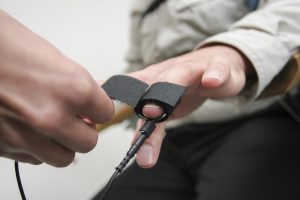
Obtaining a security clearance – at any level – is a privilege, not a right. The interests of national security require that anyone privileged to be employed by the government must be reliable, trustworthy, of good conduct and character and of complete loyalty to the United States. This means that the appointment of each civilian employee in any department or agency of the government is typically subject to some type of investigation.
Getting a clearance can be an involved process, depending on the type of clearance you are seeking. Your employer or prospective employer must first determine that your position is one requiring access to classified information, assignment to sensitive duties or work in a position of public trust.
 The process of acquiring a security clearance historically has taken anywhere from several months to several years to complete. This timeline depends on several factors including the backlog of applications, the depth of the investigation required, whether significant issues are uncovered and the adjudicative process. The Intelligence Reform and Terrorism Prevention Act of 2004 mandated that clearance agencies must make a determination on at least 90 percent of applications for a personnel security clearance within an average of 60 calendar days after investigators receive the forms.
The process of acquiring a security clearance historically has taken anywhere from several months to several years to complete. This timeline depends on several factors including the backlog of applications, the depth of the investigation required, whether significant issues are uncovered and the adjudicative process. The Intelligence Reform and Terrorism Prevention Act of 2004 mandated that clearance agencies must make a determination on at least 90 percent of applications for a personnel security clearance within an average of 60 calendar days after investigators receive the forms.
A 2010 General Accountability Office study found that most of the agencies reviewed took from 62 days to 154 days to complete the process. You can find the most up to date timelines by agency on the U.S. Intelligence Careers website. As of 2020, most agencies required a minimum of 20 weeks (with some, like the NSA, taking at least 33 weeks) to move from the initial screening to final approval for a hire.
The higher the clearance level, the deeper the investigation into your background, and the more time it is likely to take. If complicated issues come up during an investigation, it will likely take even longer.
Expect the investigation to take longer if you have:
There are several things that the applicant can do to help this process move as quickly and smoothly as possible.
Prepare in advance for the SF 86: You don’t have to wait until you receive a job offer to start working through the SF 86. Go to www.opm.gov/forms, download a copy of the SF 86 and begin compiling the needed information. It could enable you to start that new job a few weeks sooner.
Full, honest disclosure: Provide true and complete answers to questions on the SF 86 and to the investigators’ questions. Applicants sometimes try to “self-adjudicate.” They might omit certain details they believe could be problematic in obtaining their security clearance. Failure to fully disclose, however, can prolong the background investigation, raise serious questions about the applicant’s integrity and ultimately result in the denial of a security clearance or job offer.
Be prompt, be available: When a federal official contacts you for a Personal Subject Interview, a polygraph or other appointment, take the first available date. That practice will avoid prolonging the security clearance process and demonstrate your commitment to securing a clearance and starting work. Also keep the agency and investigator informed of your current address and full contact information.
 Once you have been selected for a position requiring clearance, you will then complete security forms, which may include the SF86 and/or the SF85P. Your signature on these documents will allow the agency to check your history, including employment, credit and financial records, military background, police record, medical records and other areas of your life. In some cases, you may be able to submit your information via the Electronic Questionnaires for Investigations Processing (e-Quip).
Once you have been selected for a position requiring clearance, you will then complete security forms, which may include the SF86 and/or the SF85P. Your signature on these documents will allow the agency to check your history, including employment, credit and financial records, military background, police record, medical records and other areas of your life. In some cases, you may be able to submit your information via the Electronic Questionnaires for Investigations Processing (e-Quip).
The security office will generally submit your forms or e-QIP to the Office of Personnel Management (OPM) which will conduct the investigation. A prerequisite for accessing classified national security information is the completion and favorable outcome of a background investigation. The scope of the investigation will vary, depending on the nature of the position.
Local agency checks will be conducted to review your criminal history within the jurisdictions where you have lived, worked or attended school. During the investigative process, inappropriate conduct from your past may be uncovered. This is not automatic grounds for denial of a clearance. In fact, the investigators will look deeply into the actual incident and determine its relevance on a case-by-case basis. They will consider the following factors:
The investigation may also include interviews with co-workers, family, friends and other acquaintances; a review of your medical, credit and financial history; a criminal records check; and questioning regarding illegal drug usage, contact with foreign nationals and other topics.
 Background investigations that include interviews must include a sufficient number of people who know you well, such as neighbors, co-workers, supervisors, and, if applicable, former spouses. Background investigators will want to talk to as many knowledgeable people as possible to get a balanced, accurate, and comprehensive picture of you. Later, you may have an opportunity to refute any misleading or false information that was reported about you. When investigators are conducting interviews with your references – those that you supply and those that are developed by the agency – and your past and current employers, they are trying to determine particular information about you.
Background investigations that include interviews must include a sufficient number of people who know you well, such as neighbors, co-workers, supervisors, and, if applicable, former spouses. Background investigators will want to talk to as many knowledgeable people as possible to get a balanced, accurate, and comprehensive picture of you. Later, you may have an opportunity to refute any misleading or false information that was reported about you. When investigators are conducting interviews with your references – those that you supply and those that are developed by the agency – and your past and current employers, they are trying to determine particular information about you.
Many types of background investigations involve a personal interview, which is used to validate the data you filled out in your SF86 and clarify any other information about you. Investigators will be sure to verify:
The purpose of a polygraph exam is to assist in determining whether you can be trusted with sensitive national security information. If you want a security clearance, you must be prepared to answer questions of a sensitive, personal nature and to do so honestly. Questions of personal habits, finances, trust, and loyalty to the United States are fair game.
 There are really two types of polygraph exams: the Counterintelligence Polygraph and the Counterintelligence plus Suitability Polygraph. The Counterintelligence Polygraph is used to determine if you’ve had any involvement in espionage or sabotage against the United States, while the Suitability Polygraph delves into your personal life with questions about your conduct and behavior. For instance, in a Suitability Polygraph, you may get questions about drug use, involvement in criminal conduct, and whether you were truthful on your security forms.
There are really two types of polygraph exams: the Counterintelligence Polygraph and the Counterintelligence plus Suitability Polygraph. The Counterintelligence Polygraph is used to determine if you’ve had any involvement in espionage or sabotage against the United States, while the Suitability Polygraph delves into your personal life with questions about your conduct and behavior. For instance, in a Suitability Polygraph, you may get questions about drug use, involvement in criminal conduct, and whether you were truthful on your security forms.
You should prepare for a suitability polygraph by:
According to the 2020 Security Clearance Compensation Report conducted by clearancejobs.com, “The polygraph is more about getting scared people to admit what they would have otherwise omitted on their SF-86 than it is about actually digging up deception independently. Bearing that in mind, here is the reality: the scare tactic works subconsciously on many people”. The best way to ensure that you aren’t tripped up on the polygraph test is to carefully detail everything in the SF-86, even those past events or contacts that haven’t aged well. Being up front and honest on the SF-86 proves that you have put the past behind you helps you avoid sticky situations in the polygraph exam when your interviewer inevitably asks for those details.
Polygraphs can be intimidating so it’s helpful to understand the process and follow a few best practices.
The Process
The polygraph is completed in three phases:
Applicants get three opportunities to take the polygraph before a final adjudication of their security clearance application is completed.
Best Practices
Polygraph experts recommend applicants avoid over-preparing for polygraphs and simply treat them as honest (if somewhat unusual) conversations.
The adjudicative process is the careful weighing of a number of variables known as the “whole person concept” and includes an examination of a sufficient period of your life to determine if you are an acceptable security risk. Available, reliable information about you – past and present, favorable and unfavorable – is considered in reaching a determination of your eligibility for a security clearance.
Adjudicators, who render clearance decisions, review the completed investigations. They consider all the available information – the good, the bad and the ugly – when making clearance decisions, applying the criteria for access to classified or sensitive information as spelled out in Intelligence Community Directive (ICD) 704.
Adjudicators assess the collected information against the ICD 704 Adjudicative Guidelines to decide if you are eligible for a clearance or a position of trust. If no significant adverse information is uncovered, you’ll be granted clearance eligibility at the level requested by your agency. If significant, unfavorable or unresolved material develops, it could mean that your case will be delayed until additional information is gathered and facts are verified. Ultimately, you may be denied a clearance.
Clearances can be denied only on the basis of substantive information that raises concerns about stability, loyalty, character, judgment, reliability or trustworthiness. They are never denied on the basis of gender, race, religion or sexual orientation.
The Department of Defense has gone to great lengths to ensure that the clearance process is fair and balanced. Clearances aren’t denied without people getting a chance to give their side of the story – to explain or rebut any derogatory information that has developed.
 Federal agencies will normally accept another agency’s investigation as the basis for granting a security clearance, provided your last security clearance investigation was completed within the past five years for a Top Secret clearance and 10 years for a Secret clearance, and you have not had a break in service of more than two years. Also considered is whether there have been any significant changes in your situation since your last investigation. Some federal agencies might have additional investigative or adjudicative requirements that must be met prior to their accepting a clearance granted by another agency.
Federal agencies will normally accept another agency’s investigation as the basis for granting a security clearance, provided your last security clearance investigation was completed within the past five years for a Top Secret clearance and 10 years for a Secret clearance, and you have not had a break in service of more than two years. Also considered is whether there have been any significant changes in your situation since your last investigation. Some federal agencies might have additional investigative or adjudicative requirements that must be met prior to their accepting a clearance granted by another agency.
Specifically, there are 13 Adjudication Guidelines that adjudicators consider when determining eligibility for access to classified information and eligibility to perform sensitive duties. A brief summary of each guideline is provided below, or you can review the full document on the guidelines here.

Example of a concern: Membership in an organization that supports overthrowing the U.S. government.

Example of a concern: Failure to report, when required, an association with a foreign national.
Example of a concern: Failure to report to an appropriate security official the possession of a passport issued by any other country.
 Example of a concern: Sexual behavior of a criminal nature, whether or not the individual has been prosecuted.
Example of a concern: Sexual behavior of a criminal nature, whether or not the individual has been prosecuted.
Example of a concern: Deliberately providing false or misleading information concerning relevant facts to an investigator or security official.

Example of a concern: A history of not meeting financial obligations or an inability or unwillingness to satisfy debts.
 Example of a concern: Alcohol-related incident, such as driving while under the influence.
Example of a concern: Alcohol-related incident, such as driving while under the influence.
Example of a concern: Recent drug use, illegal drug possession or drug dependence.
 Example of a concern: The individual has failed to follow treatment advice related to a diagnosed emotional, mental or personality condition, such as failure to take prescribed medication.
Example of a concern: The individual has failed to follow treatment advice related to a diagnosed emotional, mental or personality condition, such as failure to take prescribed medication.
Example of a Concern: A single serious crime or multiple lesser offenses.

Example of a concern: Collecting or storing classified information in an unauthorized location.
Example of a concern: Service or employment with the government of a foreign country.

Example of a concern: Illegal or unauthorized entry into any IT system or component thereof.
| Occupation | Average Salary |
| ENGINEERING – SYSTEMS Aerospace, Avionics, Geospatial, Modeling, Simulation, Management | $134,429 |
| IT – SOFTWARE Development, Web, Engineering, Management | $131,991 |
| MANAGEMENT Team Lead, project manager, Program Manager, Supervisor | $127,950 |
| BUSINESS – SALES Business Development, Account Management | $127,448 |
| ENGINEERING – CIVIL Architectural, Environmental, Control, Structural, Transportation, Water, Construction, Management | $125,143 |
| 2018 COMPENSATION | 2020 COMPENSATION | % CHANGE FROM 2018 | |
| Counterintelligence Poly | $100,964 | $113,568 | 12% |
| Lifestyle of Full Scope Poly | $113,862 | $116,476 | 2% |
| Don’t have current polygraph | $95.538 | $96,722 | 1% |